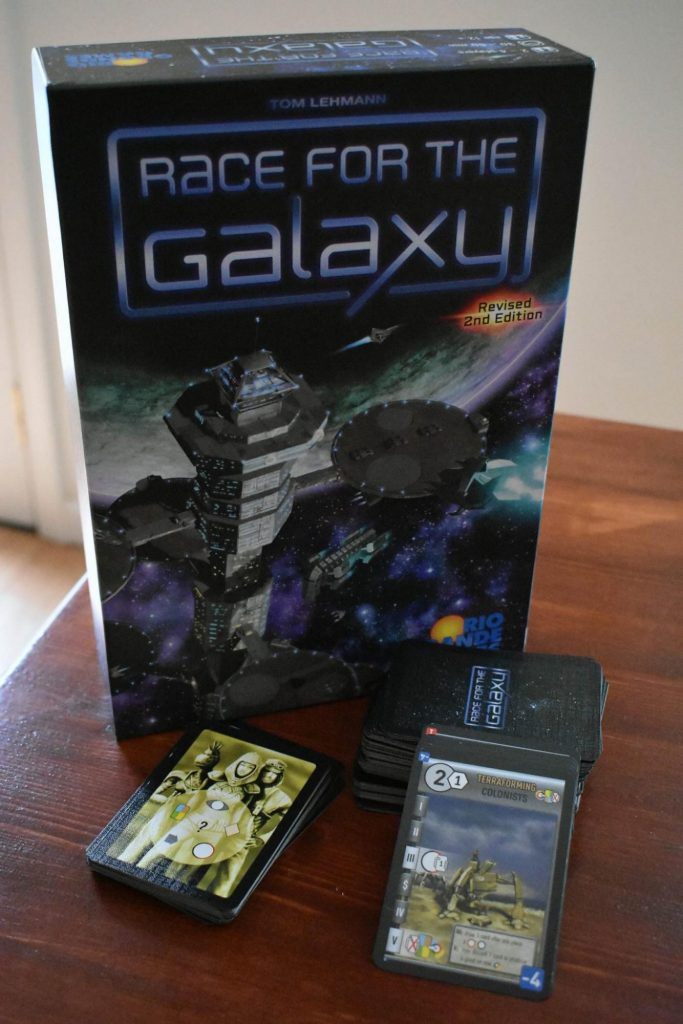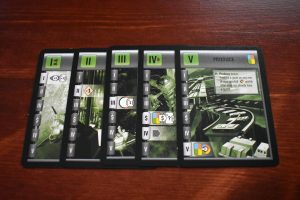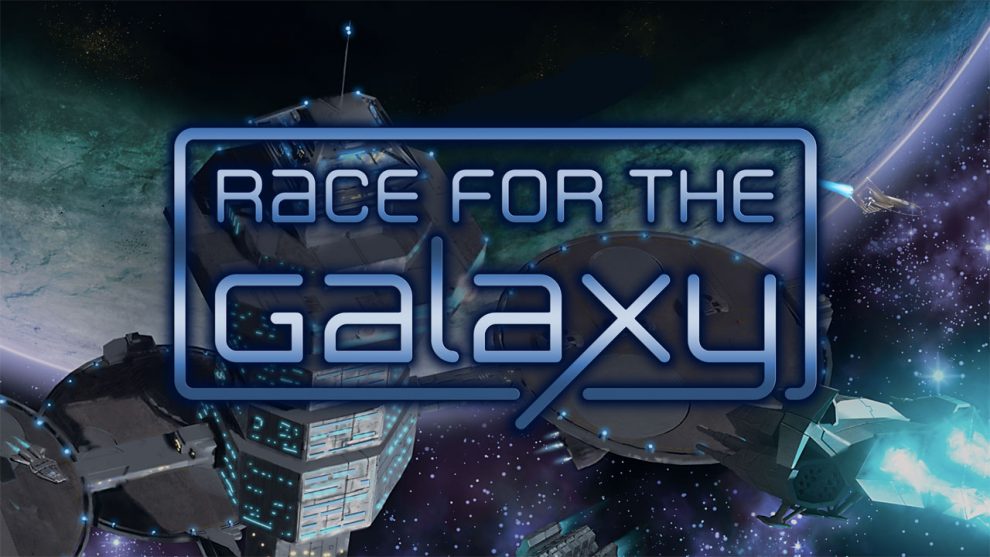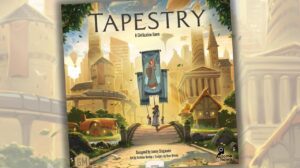Race for the Galaxy is about 12 years old, which in the lifespan of board gaming, makes it practically geriatric.
In a review I posted to BoardGameGeek about a year ago, I disrespected an elder of the gaming industry. I wrote a passive aggressive and negative review of the game where I said in oh so many words that it needed better graphic design, because how is it supposed to compete with games with equally interesting rulesets and better graphic design.

I was wrong. Race for the Galaxy is a masterful design that features an action selection mechanic that is second-to-none, and an enormous variety of possible tactics for a savvy player. And, on top of all of this, you can throw it in a bag and play it almost anywhere. Heck, play it on the side of the road!
I was an idiot. An idiot with a word processor, the most dangerous kind.
Why was I so wrong? What do I actually think of Race for the Galaxy now? These are two separate questions, so I am going to break this review/combination of philosophical musings into two parts. Part one will be about what I think my responsibility as a reviewer/writer about games is, and the second will be my (re)review of Race for the Galaxy. Hopefully, by the end, you will see the relationship between the two.
Part 1: Charity Matters in Reviewing
Let’s talk about one of my favorite philosophical concepts: The principle of charity. Now, the history of philosophy is just as long and complex as the history of board gaming, so I’m not going to make categorical statements, as I am not a philosopher (at least when I am sober). Regardless, the principle of charity requires me (a listener) to interpret a speaker’s statements in the most rational way possible, and if we’re arguing, to attempt to find the best and strongest possible interpretation of those statements (before I make a response).
More simply: it’s a good principle to live by to try and assume that other people are rational and have powerful, rational reasons for the choices that they make. Those reasons can be emotionally driven, logically driven, experience-driven–all of these fall in the space of rationality.
“AIEEEEEEEE!” You scream. “What does this have to do with games and Race for the Galaxy!?

Everything! I’ll get there, I promise. Wait for part two. Give me a little more charity here!
I’m not interested in making categorical statements about games being “good” or “bad,” nor am I trying to convince you of my status as a tastemaker. There is an enormous amount of people in the gaming community that do exemplary work as tastemakers and defenders of the hobby. I am by nature a tinkerer and pot-stirrer, and for me, the fun of games is seeing how they work–seeing how systems come together to form meaningful experiences. Because of this particular set of character traits, I excel at very few games, but I think I come up with interesting designs. These character traits led me to become a writer instead of a mathematician.
What I try to do, and what I believe in, is that I should attempt to evaluate games based on what they are trying to do, and how successful they are in that attempt, rather than simply stating my tastes and asserting that a game doesn’t line up with them. As I say above, many people do that and are better at it than I am.
Reviewing so often forgets that the thing that is being reviewed was created by a person who has thoughts and feelings, and those thoughts and feelings exist in a space of rationality that I mentioned before. Readdressing this game allows me to confront both my opinions about games and how, more often than I like to admit, I allow bias, rather than charity, to construct my opinions. I think this is bad, at least for me.
So, now for the readdress! Does Race for the Galaxy accomplish what it’s trying to do?
Part 2: Race for the Galaxy
So, let’s start again. A charitable review.
RftG is entirely card driven (there are little victory point chips, but you could use anything you wanted to track points, the only important thing is that there is a limited supply). It is a game where you build a tableau of cards across the table and your opponent(s) do the same. Your tableau functions as your resource generator, your points generator, and your special abilities generator.

How do you build said tableau? You have a hand of five different action cards (though there are a few extra because some actions have alternates). Based on the action card you choose, you and your opponent will be able to perform that action, in the order that those actions execute (1-5). All other actions are ignored.
The actions let you build things, consume resources, produce resources, and add to your main hand of cards. There’s also a second hand of cards, and this is the hand from which you will build your tableau.
Now, the genius here is something you may have heard before. In a single deck of a variety of cards, you have player action selection cards, player currency, potential cards for player tableaus, and the resources that will drive the game. Cards are multi-function. It’s a very interesting and elegant system, and due to the way that it works it allows for players to make tactical choices that control the speed of the game, the point differentials, how cards will interact with one another, and many more things that I likely haven’t discovered yet.

Whenever I teach someone this game for the first time, I hear a similar variation of the same feedback: “I see why people like this game, but man, those symbols!” I said the same thing my first three or four plays. I derided the game for its cumbersome symbology and accessibility for the casual player.
So, the response to this criticism? Let’s go back to the principle of charity.
Race for the Galaxy offers the player a compelling statement of intent: Hey there, potential player, how would you like to build an entire space civilization out of a deck of cards, in 20 minutes? You could make it a military giant, a pinnacle of technological innovation, or a hub of intergalactic commerce. It’s up to you.
Does that sound cool? Hell yes it does! Does it sound easy? Nope. The iconography is difficult, yes, but it is by no means bad. There are games in my collection that no matter how many times I reference the rulebook, the symbols don’t really connect, in spite of them being pretty. Race’s symbology isn’t pretty, but it does make sense from the perspective of graphic design (a medium based around communication, rather than artistic expression). Once you give it a few plays, it’s hard to imagine creating a symbol system that does so much in such an economical fashion.
Objects and experience both ought not to reward laziness. Building a space civilization, even in a game, requires a little bit of groundwork. If that’s not your cup of tea, there’re a million other games out there that offer experiences that glide like butter across a stack of hot pancakes. Elegance that slides across a single plane of one dimensional thought is not elegance, it’s performance. This game is elegant. It is neat, orderly, and not a single component can be removed. There’s a million expansions, and I actually prefer the base for its clockwork and utilitarian design.
The action selection mechanics are one-of-a-kind, and the variety of tactical options that emerge from a single deck of cards, and the way you can navigate through the system with the cards as your companions, woof. You can switch your tactics at just the right time and scrape a win, and the way that you and the other player decide to lay down your cards sets the tempo and pace of the game. Very few games manage timing, hand management, resource allocation, and subtle player interaction as well as this one.
Of course, Race for the Galaxy is a product of 12 years ago, so it reflects design trends of its time, and it has quirks. There are likely similar games to it that I haven’t played, and are likely equally worthy of your time and money. But board games are art, and just like art, old art doesn’t become less valuable simply because it reflects a different time. If this sort of thing is to your taste, it should absolutely make its way to your shelf, or you should experience it at least once to see what a card game can ignite in your brain.
I was wrong about Race for the Galaxy. Hopefully, you won’t be.
Links for the interested:
A cool designer diary about RftG
The principle of charity
Andrew Plassard’s review of Jump Drive
Res Arcana, Lehmann’s latest card game effort












Hi! If I love Race, what other game could you recommend?
If you enjoy tableau building, and the space theme, then Space Base might be a good choice too. Think Machi Koro in space and you’re 90% of the way there.
I’m really into the Pax games and the way they make tableau building even more interconnected. I’m not as big on Innovation, but I know that many people are big fans. I’m really enjoying The Bloody Inn right now, that’s another fun little tableau builder.